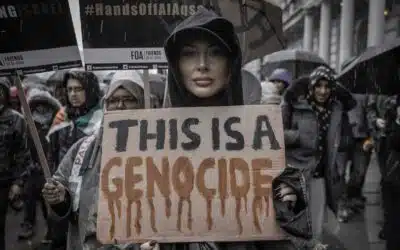With all the talk today about “spreading democracy”, two major questions should immediately come to mind. The first is whether or not there is any truth at all to the declarations of noble intent from the proponents of empire, a subject which has received great attention from every point along the political spectrum. Proponents assume the declarations to be self-evident truths and accept them without qualification or evidence (and despite the evidence to the contrary). America can make mistakes, they acknowledge, but her intentions are always pure. Critics, on the other hand, have pointed to the historical precedents indicating that spreading democracy is never the motivation for foreign intervention, despite previous similar claims of benevolent intentions.
So while the debate has focused the divide between those who think America has a duty to spread democracy (and who claim that this is, in fact, what she is doing) and those who think that democracy cannot be forced upon others at gunpoint (and who claim any variety of alternative motivations for foreign interventions while denying that democracy has anything to do with it), few have bothered to question the basic assumption that democracy is the form of government of the United States, and that it is this form of government that best advances the principles of freedom and liberty in the world.
America’s Founding Fathers had something else to say about the democratic form of government. “A democracy,” said Thomas Jefferson, “is nothing more than mob rule, where fifty-one percent of the people may take away the rights of the other forty-nine.”
“Remember,” implored John Adams, “democracy never lasts long. It soon wastes, exhausts, and murders itself. There never was a democracy yet that did not commit suicide.”
“Democracy,” as described by Benjamin Franklin, “is two wolves and a lamb voting on what to have for lunch” (while “Liberty is a well-armed lamb contesting the vote”).
“Democracies,” explained James Madison, “have ever been spectacles of turbulence and contention; have ever been found incompatible with personal security or the rights of property; and have in general been as short in their lives as they have been violent in their death.”
“There is no maxim, in my opinion,” Madison also said, “which is more liable to be misapplied, and which, therefore, more needs elucidation, than the current, that the interest of the majority is the political standard of right and wrong.”
“It has been observed that a pure democracy,” noted Alexander Hamilton, “if it were practicable, would be the most perfect government. Experience has proved that no position is more false than this. The ancient democracies, in which people themselves deliberated, never possessed one good feature of government. Their very character was tyranny; their figure deformity.”
And long before the American Revolution, the Greek philosopher Plato had observed that “Democracy leads to anarchy, which is mob rule.”
Huh? Is this the same form of government hailed today as that most hospitable to “freedom” and “liberty”, and used almost synonymously with those terms? Didn’t the Constitution establish a democracy? The answer to the latter question, it may come as a surprise to some, is an emphatic, “No”.
When asked what kind of government was being formed by the revolutionaries, Ben Franklin replied, “A republic, if you can keep it.”
Similarly, Alexander Hamilton emphasized that “We are now forming a Republican form of government. Real Liberty is not found in the extremes of democracy, but in moderate governments. If we incline too much to democracy, we shall soon shoot into a monarch or some other form of dictatorship.”
As for the Constitution, it states that “The United States shall guarantee to every State in this Union a Republican Form of Government” (emphasis added).
So what’s the difference between a democracy and a republic? In the Federalist Papers (#10), James Madison, writing under the pseudonym “Publius”, defined a democracy as “a society consisting of a small number of citizens, who assemble and administer the government in person”, whereas a republic is “a government in which the scheme of representation takes place”.
Again, in Federalist #14, Madison remarked on the frequent “confounding of a republic with a democracy”, repeating that “The true distinction between these forms…is, that in a democracy, the people met and exercise the government in person; in a republic, the assemble and administer it by their representatives and agents.”
The confusion is heightened by the recognition of a form of government known as “representative democracy”, which is even more easily confounded with the republic than Madison’s “pure democracy”. According to Madison’s criteria, a “representative democracy” would be an oxymoron. Some might say that, while there is a distinction between a democracy and a republic, the terms “representative democracy” and “republic” are synonymous. But there yet remains the possibility of another important distinction.
As the Founding Fathers noted, the democracy lent itself to “mob rule”, where individual rights were easily trampled upon. The republic, on the other hand, was not only designed to allow for a greater number of citizens within a greater territory than is possible under a democracy, but also to protect the rights of the individual.
This, it seems, is truly the most significant difference between a republic and a democracy, and renders the two forms of government not close relatives but virtual opposites. In contrast to “the tyranny of the majority”, whether by direct control of the people (democracy) or through representatives (representative democracy), the republic recognizes individual rights and is designed to protect them.
Indeed, that is the most important obligation of the republican form of government, and the principle purpose for its establishment. When Thomas Jefferson wrote that “all men are created equal, that they are endowed by their Creator with certain unalienable Rights, that among these are Life, Liberty and the pursuit of Happiness.—That to secure these rights, Governments are instituted among Men, deriving their just powers from the consent of the governed…”, he was not talking about any of the various forms of despotisms, oligarchies, plutocracies, monarchies, or even democracies. He was speaking specifically with regard to the republic. All other forms of governments, as the Declaration of Independence makes perfectly clear, were not considered to be valid or authoritative by the Founding Fathers; for all such governments are inevitably “destructive of these ends”, and, having therefore failed in their prime directive, are subject to abolishment by the people.
An interesting example of the earlier recognition of this fundamental difference (that is today quite intentionally forgotten) is found in the 1928 U.S. Army training manual, which defining each as follows:
Democracy:
- A government of the masses.
- Authority derived through mass meeting or any other form of ‘direct’ expression.
- Results in mobocracy.
- Attitude toward property is communistic – negating property rights.
- Attitude toward law is that the will of the majority shall regulate, whether it be based upon deliberation or governed by passion, prejudice, and impulse, without restraint or regard to consequences.
- Results in demagogism, license, agitation, discontent, anarchy.
Republic:
- Authority is derived through the election by the people of public officials best fitted to represent them.
- Attitude toward property is respect for laws and individual rights, and a sensible economic procedure.
- Attitude toward law is the administration of justice in accord with fixed principles and established evidence, with a strict regard to consequences.
- A greater number of citizens and extent of territory may be brought within its compass.
- Avoids the dangerous extreme of either tyranny or mobocracy.
- Results in statesmanship, liberty, reason, justice, contentment, and progress.
The difference between a republic and a democracy, you see, “is like that between order and chaos” (to quote Supreme Court Justice John Marshall). It is also like that between a “right” and a “privilege”, two terms almost as easily confounded. But while the terms are often used synonymously, the truth is that they are likewise virtual opposites. A “right” is “an entitlement to something”, whereas a “privilege” is “a special benefit”. A “right”, as defined by the Declaration of Independence, is God-given and inalienable. A “privilege”, on the other hand, is granted by other men, sovereign over servant, and quite alienable.
The Constitution established a republic in which the people were sovereign. This sovereign people established a government and granted it certain privileges. If it feels like the reverse is true today, that the government has usurped sovereignty and that people have privileges and license rather than God-given rights, it can only be because the present United States is not the republic established by the Founding Fathers. This cold, hard fact may not come easily to many, but ignoring it, or pretending that the “democracy” flaunted today is the same government ordained by the Constitution, could prove politically fatal in the long haul.
The Constitution, for all its worth, is not a perfect document. It has serious flaws, one of which is crucially related to the present topic. Consider that Thomas Jefferson, in the Declaration of Independence, included in his definition of “absolute Tyranny” the charge against the King and his men that they had “[declared] themselves invested with power to legislate for us in all cases whatsoever” (emphasis added).
Now go to the Constitution, Article 1, Section 8, which states that “Congress shall have Power…To exercise exclusive Legislation in all Cases whatsoever, over such District…as may…become the Seat of the Government of the United States, and to exercise like Authority over all Places purchased by the Consent of the Legislature of the State…” (emphasis added).
Notice anything interesting there? The Constitution really established two basic governments. It guaranteed that each state would be a republic, and although they would all be bound together by treaty, each would be an individual and sovereign commonwealth. But the truth of the matter, which seems to be a closely-guarded secret (it is certainly not disclosed to us in our high school history classes), is that the Constitution also established a kind of despotism (a “Tyranny” in the Declaration), commonly described today as a “democracy”.
Of course, this “democracy” was intended for only the territory comprising the “Seat of the Government” and other modest parcels of land within the states dedicated to “the Erection of Forts, Magazines, Arsenals, dock-Yards, and other needful Buildings”. And the Founding Fathers were wise enough to limit the District housing the Seat of Government to “ten Miles square”. Unfortunately, the beast has got out of its cage. This was accomplished through legalistic sleight-of-hand that the Pharisees of Judea at the turn of the Common Era could only marvel at enviously. But while the law itself is purposely convoluted and confusing, the trick is really quite simple. All that need be done is to get people to acknowledge that they are a “citizens of the United States” rather than “Citizens of the United States” (Art. 1, Sec. 2,3; Art. 2, Sec. 1) or “Citizens of each State” (Art. 4, Sec. 2), respectively.
See, in legal terminology, every jot and every tittle is of utmost significance. Words which have one meaning in the common, vernacular usage can have almost opposite definitions in the language of the law. A legal “person”, for example, includes McDonald’s and General Motors. So, if you’ve missed the significant jot in the above paragraph, check it again with a more discerning eye (yes, capital letters also have significance).
Originally, people were considered to be citizens of their respective states, and thus, by default, “a Citizen of the United States”. The term “United States” was used pluralistically in this sense, referring to the union of the “several States”. Then came the Civil War and the 13th Amendment, which outlawed slavery “within the United States, or any place subject to their jurisdiction” (emphasis added). But there was a catch. While the 13th Amendment made the practice of slavery illegal, it made no provision recognizing the citizenship of men formerly considered to be “property”. Enter the 14th Amendment: “All persons born or naturalized in the United States, and subject to the jurisdiction thereof, are citizens of the United States” (emphasis added).
There are three important clues within the language of this section of the amendment. The first is the lower-case spelling of the word “persons” (compare with “Person(s)”, Art. 1, Sec. 2, 3, 6, 9; Art. 2, Sec. 1; Art. 3, Sec. 3; Art. 4, Sec. 2). This is the first hint of a possible distinction between real, in-the-flesh human beings and corporate “legal fictions” (supported by mountains of other evidence beyond the scope of our present purpose). The second is the use of the word “the” (singular), which contrasts starkly to the language of the previous Amendment (“their”, plural). This strongly suggests that “United States”, as used in this particular Amendment, does not refer to the union of the “several States”, but specifically to the federal government, with its power to exercise “exclusive Legislation in all Cases whatsoever”.
The third clue has already been identified as the distinction between a “Citizen” and a “citizen”. If the significance of this difference remains obscure to the reader, consider that the federal “United States” is a “legal fiction”, a “person”, or a “corporation”. This fact has long been recognized by the Supreme Court. The act of congress of February 21, 1871, entitled “An act to provide a government for the District of Columbia”, constituted “a body corporate for municipal purposes” that “may contract and be contracted with, sue and be sued, plead and be impleaded, have a seal, and exercise all other powers of a municipal corporation”. At Title 28, VI, Chapter 176, Subchapter A, Section 3002 of the United States Code, “United States” is defined as “a Federal corporation”.
It is true, that which is taught, that this Amendment established a new class of citizenship. However, it does not appear, after scrutiny, to do so by recognizing the equal rights of African Americans. Instead, it made everyone, whites and blacks alike, citizens of the federal United States, and, therefore, “subject to its jurisdiction”. Of course, a person – by which I mean a real human being – living in one of the states is not an inhabitant of the District of Columbia or any federal territory, and so would not, under normal circumstances, be subject to federal jurisdiction. The solution to this dilemma is quite simple. Just as a corporation is a legal “person”, so, conversely, can a person be made a corporate entity, a legal fiction. The trap laid, all that need be done is to wait and wait for the people to ensnare themselves by unknowingly associating themselves with their respective strawman, which is accomplished through various contracts, the existence of which the individual may not even be aware. Having once done so, the individual places his or herself under Admiralty or Commercial jurisdiction, called “Statutory” by the courts, which is basically a system of laws governing contracts in commerce.
The thing with contracts is that they override the Constitution. While one may initially react with shock and horror to this notion, it is quite just and equitable. In fact, society could not function were it to be otherwise. Consider, for example, that one person contracts with another person, and that included in the terms of the contract is a non-disclosure agreement. Can the one person then disclose the secrets of the other’s trade by citing the right to free-speech guaranteed under the 1st Amendment? Certainly not! Contracts override the Constitution, and that includes contractual agreements with the federal United States government. Thus it is that We the People have contracted ourselves out of our respective republics and into a representative democracy, surrendered our rights in favor of privileges and promises of “security” (Ben Franklin had something to say about that), and denied our sovereignty by acceptance of the appellation of a corporate fiction.
While it is beyond the scope of this article to delve deeper into the rabbit hole of legalisms and other evidences of the aforementioned state of affairs, it should nevertheless be recognized that the proper form of government for the United States of America is not the democracy, but the republic. It is right to question the sincerity of government authorities when they declare pure intentions for military interventions abroad, such as “spreading democracy”. It is reasonable to wish to examine evidence for this, rather than to accept declarations of noble intent as absolute truth. But while it is widely recognized that democracy is not the object of our wars, it should not be lost upon us, as the war of words is waged in the media, that neither is it desirable – at least not according to our Founding Fathers.


